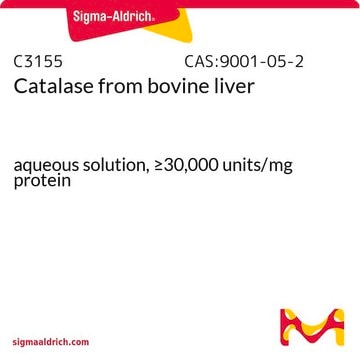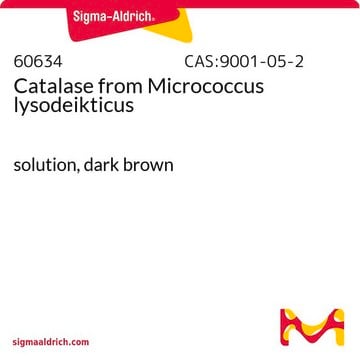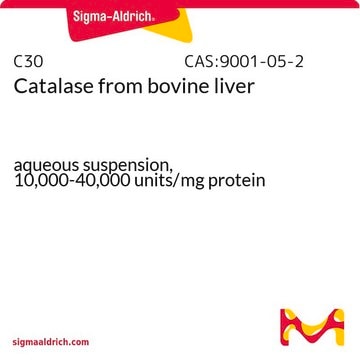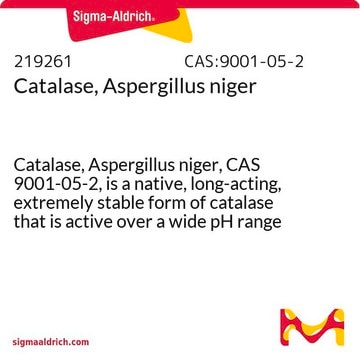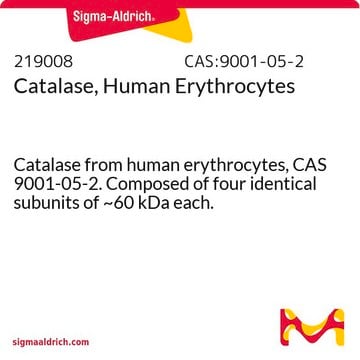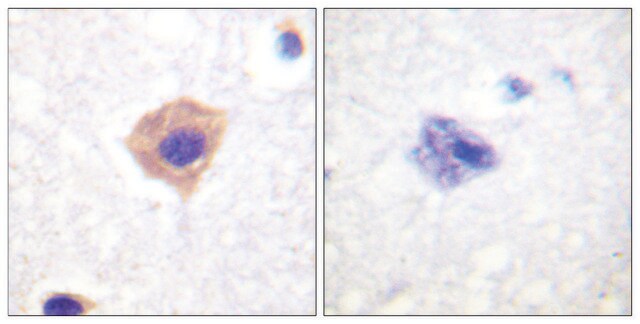02071
Catalase from Corynebacterium glutamicum
solution, deep brown, ≥500000 U/mL
Sign Into View Organizational & Contract Pricing
All Photos(1)
About This Item
CAS Number:
MDL number:
UNSPSC Code:
12352204
NACRES:
NA.54
Recommended Products
biological source
bacterial (Corynebacterium glutamicum)
form
solution
concentration
≥500000 U/mL
color
deep brown
shipped in
wet ice
storage temp.
2-8°C
InChI
1S/C9H10O3/c1-2-12-9(11)7-3-5-8(10)6-4-7/h3-6,10H,2H2,1H3
InChI key
NUVBSKCKDOMJSU-UHFFFAOYSA-N
General description
Catalase is ubiquitously found in animals, plants, fungi, and humans. It is made up of looped polypeptide chains that are arranged as tetramers or dimers and a core, that contains iron or manganese ions. Catalase can be differentiated into two types such as heme-containing (type I), which possesses an iron-porphyrin cofactor and a non-heme-containing (type II), which possesses a dinuclear manganese active site.
Application
Catalase from Corynebacterium glutamicum has been used to identify and characterize purified bacterial peptide (PPBP) produced from Bacillus thuringiensis. It has also been used to study its inhibition by nitric oxide.
Biochem/physiol Actions
Catalase is an antioxidant enzyme that plays a role in alleviating oxidative stress by the removal of hydrogen peroxide to produce oxygen and water. Lower levels of catalase lead to several age-related disorders including hypertension, anemia, vitiligo, Parkinson′s disease, Alzheimer′s disease, schizophrenia, bipolar disorders, diabetes mellitus, and cancer.
Unit Definition
1 U corresponds to the amount of enzyme which decomposes 1 μmol H2O2 per minute at pH 7.0 and 25°C
Physical form
contains ~30% glycerol, 10% ethanol
Signal Word
Warning
Hazard Statements
Precautionary Statements
Hazard Classifications
Flam. Liq. 3
Storage Class Code
3 - Flammable liquids
WGK
WGK 1
Flash Point(F)
105.8 °F - closed cup
Flash Point(C)
41 °C - closed cup
Personal Protective Equipment
dust mask type N95 (US), Eyeshields, Gloves
Certificates of Analysis (COA)
Search for Certificates of Analysis (COA) by entering the products Lot/Batch Number. Lot and Batch Numbers can be found on a product’s label following the words ‘Lot’ or ‘Batch’.
Already Own This Product?
Find documentation for the products that you have recently purchased in the Document Library.
Customers Also Viewed
Nitin Kumar et al.
Science advances, 4(10), eaat7779-eaat7779 (2018-10-20)
Active materials are capable of converting free energy into directional motion, giving rise to notable dynamical phenomena. Developing a general understanding of their structure in relation to the underlying nonequilibrium physics would provide a route toward control of their dynamic
Zh P Kopteva et al.
Mikrobiolohichnyi zhurnal (Kiev, Ukraine : 1993), 75(1), 41-47 (2013-03-23)
Lipolytic and catalase activity of Pseudomonas pseudoalcaligenes 109, Rhodococcus erythropolis 102, Bacillus subtilis 138 and their association with different growth models: biofilm and plankton ones. It is shown that under biofilm conditions the fermentative activity of bacteria under study was
L V Barabash
Klinicheskaia laboratornaia diagnostika, (12)(12), 14-17 (2013-03-14)
The technique of cosinor-analysis was applied to study the oncological dynamics of hormonal and lipid status, activity of peroxide oxidation of lipids in 580 healthy males and females residing in the Western Siberia. The clear circannual rhythm of gluco-corticoid function
Angela Sacchi et al.
Environmental pollution (Barking, Essex : 1987), 177, 82-89 (2013-03-12)
Coastal lagoons are constantly subjected to releases of chemical pollutants, and so organisms may be exposed to such toxicants. This study investigated through a multivariate approach the physiological status of bivalve Ruditapes philippinarum, farmed in Sacca di Goro lagoon. Biomarkers
Danielle de Lima Ávila et al.
Archives of medical research, 44(3), 194-202 (2013-03-26)
It is believed that oxidative stress plays a role in the pathogenesis of diabetes mellitus. Several strategies have been developed with the objective of minimizing diabetic complications. Among these, inhibitors of dipeptidyl peptidase-IV (DPP-IV), which act by blocking degradation of
Our team of scientists has experience in all areas of research including Life Science, Material Science, Chemical Synthesis, Chromatography, Analytical and many others.
Contact Technical Service
